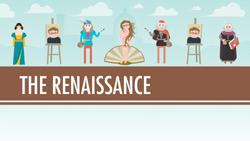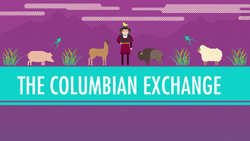|
|
CRASH
COURSE History Videos
In 42 episodes, John Green
will begin teaching you the history of the world!
This course is based on the
2012 AP World History curriculum, from growing the first crops in the First
Agricultural Revolution to global textile production in the 2010s. |
| Some videos
with review material for my awesome World History students: |
 |
 |
Goals
& Objectives
of the Crash Course videos:
By the end of the course,
you will be able to:
*Identify and explain historical
developments and processes
*Analyze the context of
historical events, developments, and processes and explain how they are
situated within a broader historical context
*Explain the importance
of point of view, historical situation, and audience of a source
*Analyze patterns and connections
among historical developments and processes, both laterally and chronologically
through history
*Be a more informed citizen
of the world |
|
In which John Green teaches
you about the European Renaissance. European learning changed the world
in the 15th and 16th century, but was it a cultural revolution, or an evolution?
We'd argue that any cultural shift that occurs over a couple of hundred
years isn't too overwhelming to the people who live through it. In retrospect
though, the cultural bloom in Europe during this time was pretty impressive.
In addition to investigating what caused the Renaissance and who benefitted
from the changes that occurred, John will tell you just how the Ninja Turtles
got mixed up in all this. |
In which John Green teaches
you about the changes wrought by contact between the Old World and the
New. John does this by exploring the totally awesome history book "The
Columbian Exchange" by Alfred Cosby, Jr. After Columbus "discovered" the
Americas, European conquerors, traders, and settlers brought all manner
of changes to the formerly isolated continents. Disease and invasive plant
and animal species remade the New World, usually in negative ways. While
native people, plants, and animals were being displaced in the Americas,
the rest of the world was benefitting from American imports, especially
foods like maize, tomatoes, potatoes, pineapple, blueberries, sweet potatoes,
and manioc. Was the Columbian Exchange a net positive? It's debatable.
So debate. |




